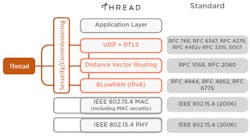Silicon Labs’ new Wireless Gecko family of ARM Cortex-M4 core-based SoCs targets wireless applications such as the Internet of Things (IoT). They integrate with a 2.4 GHz radio and advanced hardware cryptography to support more secure applications. The security support handles AES with 128- or 256-bit keys, elliptical curve cryptography (ECC), SHA-1, and SHA-224/256. The chips can support ZigBee and Thread (Fig. 1) as well as Bluetooth and proprietary protocols.
1. Thread is becoming a popular, wireless, standards-based microcontroller IoT platform.
The family is divided into three sections that target specific protocols.
- Blue Gecko–Bluetooth Smart connectivity
- Mighty Gecko–802.15.4 ZigBee and Thread connectivity for mesh networks
- Flex Gecko–Proprietary wireless protocol options
The software-programmable power amplifier (PA) can deliver output power from -30 dBm up to 19.5 dBm. It has an integrated balun to help reduce the bill of materials (BOM) cost. The chips have up to 256 Kbytes of flash memory and 32 Kbytes of RAM. The Geckos consume 63 μA/MHz in active mode.
The Blue Gecko supports Bluetooth Smart (Bluetooth Low Energy or “BLE”) and BLE 4.2. Silicon Labs provides the Bluetooth Smart software stack as well as the BGScript scripting language that allows developers to get to market more quickly. It will be able to support the emerging Bluetooth mesh network.
The Mighty Gecko targets 802.15.4 mesh networks including Thread and ZigBee. This includes a pre-certified Thread stack and a ZigBee Pro stack. The Flex Gecko provides support for popular proprietary protocols.
The wireless transceiver can also be configured for sub GHz communication. It is also possible to switch between configurations to handle low-duty-cycle communication. This would allow applications like a Thread-based wireless gateway. The SoC would normally be sleeping, but could periodically wake up to handle 802.15.4 Thread communication and then sub GHz communication.
Silicon Labs’ Simplicity Studio supports the Wireless Gecko. It is available on Windows, Mac, and Linux. It supports the Energy Profiler, a real-time power debugger. The chips also have a packet trace port.
The chips are available in 5-mm by 5-mm QFN32 and 7-mm by 7-mm QFN48 packages (Fig. 2). The Blue Gecko Starter Kit is priced at $99 and the Mighty Gecko Mesh Development Kit that supports ZigBee, Thread, Bluetooth Smart, and proprietary protocols is priced at $499. Chip pricing starts at $0.99 for the Blue Gecko, $2.11 for the Mighty Gecko, and $2.06 for the Flex Gecko.


